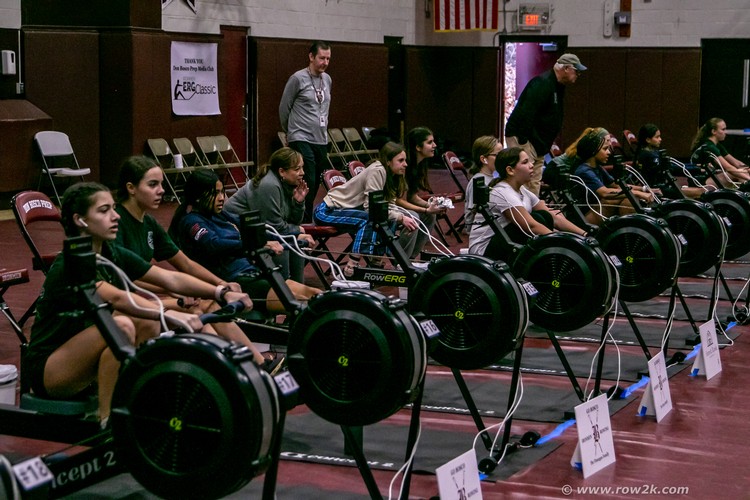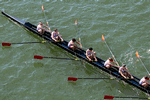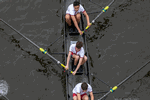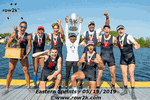Training Plans, Part 2: Mental Prep for Racing

To learn more about this series and the topics we plan to cover, please visit the Youth Coaches Corner's index page. Youth coaches are more than welcome to contact row2k to get involved in future columns.
This week, we asked coaches about how they use Training Plans to help athletes get ready for testing on the erg and racing on the water.
How does your program mentally prepare young athletes to perform on testing/race days?
JULIAN CANHA - DC NATIONAL ROWING CLUB - HEAD COACH/DIRECTOR
I think athletes draw confidence from feeling well prepared. We practice racing regularly so that when kids go to race or test they don’t feel like they have to do anything extraordinary. You have to practice putting your hand in the fire. It never gets comfortable, but you get better at it.
So that’s the general idea, but there are plenty of ways it can go wrong. When a rower has a rough workout or series of workouts, it’s worth checking in with them. What are they struggling with? Maybe they haven’t been getting enough sleep or eating properly. We try to preempt those cases as much as possible, but they’re bound to happen. Some kids struggle with anxiety or are fearful because they lack confidence in themselves.
For kids who struggle with anxiety, we point them to resources that help them to practice mindfulness. The toughest cases are when rowers struggle to perform because of a negative self image. There’s only so much you can do about that, but sometimes when you show a rower you believe in them it can help them believe in themselves.

JULIA HOWARTH - BAYLOR SCHOOL - HEAD WOMEN'S COACH
I use a 2K prep workout that is a five week cycle. It’s 4x500m with a 1’ rest, then the next week 45”, then 30”, 15” and then no rest. The athletes have found the 30” as the best predictor and comment that the 15” is too short of a rest. But overall, they use it as a confidence booster and an opportunity to test out splits/plans when the pressure is off.
PARKER WASHBURN - DEERFIELD ACADEMY - WOMEN'S HEAD COACH
We have certain workouts that I think are effective in preparing athletes for our race distance and I try my best to make the most of weather conditions during the week to prepare them for the forecasted weather on race day.
I make a point, almost daily, of describing the specific reasons why we are doing the workouts. Generally speaking, athletes in our sport are motivated to work, but they are also curious. Giving them some insight into the 'why' of their workout can help them understand how this might prepare them for race days.
ZACH SPITZER - NEREID BOAT CLUB - HEAD MEN'S COACH
We try and make “test” day just feel like a normal workout. We don’t want any more pressure on one day than any other during training. The pressure is going to come on its own, so we don’t need to be adding to it.
I saw a great thing from I think the BU Women’s Team on Instagram a few years back, where they call a “test” piece, like a 5k or 2k, a 'check-in' rather than a 'test.' I like that because it is just meant to be a benchmark, not the end all be all of workouts. It's just another workout showing how fit you are, or are not, in that moment; it won’t define your whole year. We also do a ranking system of all the workouts we do, so that each workout has value everyday rather than one holding all of the weight.

LORNA RUNDLE - MONTCLAIR HS - WOMEN'S HEAD COACH
We place a lot of emphasis on mental training as well as physical. It's important for all sport but particularly for a sport like rowing which hurts! It's essential to help youth athletes develop skills to grow mental resilience, not just for sport but for life.
Communication is key. We talk a lot. What is going right? What is not? What can we improve? We encourage autonomy and teach our athletes to take responsibility for analyzing their training, testing and racing and to think critically for themselves, about performance.
We regularly use goal setting, visualization, self talk and recently we have incorporated a lot of breathing and meditation, which our team loves. We will also create some challenging and difficult sessions to specifically work on building confidence and resiliency which we may need to use in a race.
We also make sure that all our coaches understand the importance of a positive team environment and that we as the adults are modelling the right behavior. We have always taught our kids to welcome challenges and to thrive on adversity.
CHRIS RICKARD - JACKSON/REED HS - HEAD WOMEN'S COACH
This year we actually decided not to have “tests”. We found that athletes were building them up in their heads and putting so much stress on them that they were underperforming. Instead we focused on our weekly aerobic-threshold workouts as the main gauge of progress. We kept the workout consistent for one month at a time so athletes could track their progress week to week, but also it reduced the stress on any individual workout since they would have an opportunity to do it again the next week.
For the athletes, it was less daunting and the coaches still got what we needed as far as measuring improvement and relative fitness of the team. We still had optional 5k and 2k tests, but those were just for personal use for college recruitment.
On the water, we had a similar approach: seeing each race as an opportunity and practice. That way, by the time you get to championship racing, you’ve gone through the motions enough time to have a good routine and know how to handle the nerves.

JOSH BAKER - ATOMIC ROWING - HEAD MEN'S COACH
This has been a focal point this winter season and mental training is worked into our regular training plan. Every Monday, we'll set aside the first 10-15 minutes of practice to discuss some aspect of rowing or training: from power curves, to physiology, to biomechanics and nutrition. Now, we are transitioning into more mental training and development to include positive self-talk, concentration, visualization and composure.
While these may be more difficult concepts for some of our younger rowers, we have seen some new approaches to training, erg testing, and both the internal and external dialogue leading up to difficult workouts, so our coaching staff is excited to see how this translates into Spring racing.
DREW COMBS - LITCHFIELD HILLS ROWING CLUB - HEAD COACH
Call them challenges, explain failure is good, mix in as many ways to be competitive and do a 2k as possible to remove the stigma, and discuss how 2ks are effected by training. Teach them how to measure a good performance vs a PR and, most importantly, how to figure out why did they fail and how to do things differently to help be successful.
As for racing, teach how will starts run, show them the course in a practice, walk through the challenges of each course, practice starts, and even make them mess up starts. Run full dress rehearsal races at practice, where they show up, rig the boat, dress in unis, have to be on time at the start line: everything.

KIRSTEN PRESKENIS - FARMINGTON HS - HEAD WOMEN'S COACH
Set realistic goals, and build their confidence through preparation and by reminding them of past success.
Erg tests and races are extremely difficult and some athletes will be emotionally vulnerable, especially in the last half of the piece. How we respond as coaches after a test or race is critical. If things didn’t go well, we try to be understanding and look at ways to problem-solve with the athlete. This teaches ownership, resilience, and how to move onward and upward.
We draw on our own experiences as athletes, too. We’ve all had a bad piece or two. What did our coaches say that was effective at the moment? What wasn’t effective? For me, the coaches that stayed positive and collaborated with me to find a solution were the ones that helped the most. I try to emulate that with my own athletes.
GEORGE KIRSCHBAUM - JUNIORS COACH - AUTHOR OF 'THE DOWN AND DIRTY GUIDE TO COXING'
Today’s kids want to know, they want to understand, and they want to prepare. Giving athletes a race plan for their test or race can be a huge help, as well as doing workouts that help them prepare for the event.
I have used a matrix of 500m pieces across several weeks before the first big 2k that gave the kids a target split they could count on to be successful with, even if they didn’t PR. They almost always did. It gave them the physical and mental confidence to be ready even if they were still nervous.
To help combat the nerves, we started to use mindfulness techniques during practice, and brief mediations before or after practice began so they could calm their minds (kids already have way too much on their plate outside of rowing). It was just a time to be quiet with themselves and these skills helped when they sat down to test or race since they learned to be in the moment, quiet the distracting chatter in their heads, and quiet their heart rates. It works and the science is there backing it up. The kids are often skeptical but appreciate it, even if it is just 5 minutes as a group.

ED FELDHEIM - FAIRFIELD PREP - HEAD MEN'S COACH
Having specific goals for each race can help a lot. Periodizing the focus as the season goes on, so that by the final few races the guys feel like they have a complete performance in the boat.
A few years ago I heard GB sculler Mark Hunter discuss how he and Zac Purchase actually worked to have the exact same thoughts from stroke one to stroke 220 down the course in Beijing. That's always stuck with me and while I don't think is feasible to have nine high school boys even attempt this, the idea is valuable. I use it to help the athletes understand that having a common focus for each race is a key to success.
MATT GRAU - THREE RIVERS ROWING - WOMEN'S HEAD COACH
Our program stopped doing erg testing during COVID, and this is our first full season with frequent testing. We utilize a variety of tests (2k, 20’, 3x1’ watt, 5’r24) so that athletes don’t get too focused on one specific number, and we have S.M.A.R.T. goal setting sheets (Ed. Note: Specific, Measurable, Achievable, Relevant, Timely) and testing evaluation forms as part of each athlete’s training binders.
For race day, as we approach our “important” races we run the race-day warmup at the start of every single practice and find that the development of a routine can be very helpful for framing race day performance.

If you enjoy and rely on row2k, we need your help to be able to keep doing all this. Though row2k sometimes looks like a big, outside-funded operation, it mainly runs on enthusiasm and grit. Help us keep it coming, thank you! Learn more.
Comments | Log in to comment |
There are no Comments yet
| |
- Bont Rowing
- Calm Waters Rowing
- Concept 2
- Craftsbury Sculling
- The Crew Classic
- CrewLAB
- Croker
- Durham Boat Co.
- Empacher
- Faster Masters
- Filippi
- Fluidesign
- h2row.net
- HUDSON
- Live2Row Studios
- Nielsen-Kellerman
- Oak Ridge RA
- Peinert Boat Works
- Pocock Racing Shells
- Race1 USA
- RowKraft
- Rubini Jewelers
- Vespoli USA
- WinTech Racing
- Bont Rowing
- Calm Waters Rowing
- Concept 2
- Craftsbury Sculling
- The Crew Classic
- CrewLAB
- Croker
- Durham Boat Co.
- Empacher
- Faster Masters
- Filippi
- Fluidesign
- h2row.net
- HUDSON
- Live2Row Studios
- Nielsen-Kellerman
- Oak Ridge RA
- Peinert Boat Works
- Pocock Racing Shells
- Race1 USA
- RowKraft
- Rubini Jewelers
- Vespoli USA
- WinTech Racing

















